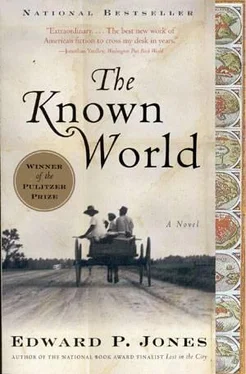With the fourth week he began going off in the night and returning before morning, seemingly with no trouble from the patrollers. Several slave women in the area knew his name and knew it well; he told one he was a preacher and had been called by God Almighty. For a week he walked by Alice and they would not say a word to each other but each time they waved as though they were passing in the marketplace. Then one night he said hello and she started in on her nonsense and he turned and started walking with her, listening to everything she said. He wanted to know how long she would keep it up and found that she could outlast his walking beside her.
What Fern and Ramsey were to discover was that he had somehow gotten hold of a piece of paper and made himself a pass and had been showing it to patrollers any night they found him on the road. He had been fortunate that he had not run into Oden Peoples. “This nigger,” the paper said, “is on business for his owners, Ramsey and Fern Elston at the Elston Estate. He can be trusted to come back home.” It was signed “Fern Elston,” but it looked nothing like her signature because he had never seen it. The Elstons took that pass away from him, not knowing he had another signed “Ramsey Elston.” On that one he was not just on “business” for the Elstons but “urgent business.”
But the worst of it was that he started calling out whenever he was near the house that he wanted his money. “I ain’t forget yall got my money. I ain’t forgot what yall owe me. I want my five hundred dollars.” In the night, before they took his passes away, he would say it. He said it on the way to the blueberries and he said it on the way to a nap. “I ain’t forgot yall got my money.” Ramsey came out one morning and shot his pistol over Jebediah’s head, but that didn’t stop him.
Then, three days after Ramsey returned to gambling, Fern came out and told him she wanted him to turn over a new leaf. She had Colley and two other men grab hold of Jebediah in front of the cabin he shared with one other unattached man. “This will all end today,” Fern said. “I have been patient, but my patience is at an end. If you do not do right, I will have you in chains again.”
Jebediah said, as she walked away, “If you was my woman you wouldn’t be sleepin in that bed alone every night.” She stopped but she didn’t turn around. “Do you know how long it would take me to undo your hair and get them things off you? You know how long?” He must have known, with that heart and mind born in slavery, that he had gone way too far and he bowed his head. Without a word from Fern, the men released him and Jebediah took off his shirt and lay on his stomach on the ground. Fern never like to flog slaves; for every whip mark on one slave’s back, she estimated that his value came down $5. But there were some unforgivable matters in the world.
They whipped him fifteen times, the last five having little effect because he had passed out at ten. He took a week to recover, was silent as he went about his work. And he didn’t stray. A week after he went back to work he stepped on a plank with a rusty nail in the barn. He thought nothing of it at first, just doctored the wound with a little mud and some spiderwebs. But the wound festered, and in the end, they had to saw off Jebediah’s right foot to save his life, or so the white doctor said.
He didn’t move from the front of his cabin after that, except to go to the privy or to go in to eat and sleep. A little less than two weeks after they cut off his foot Fern came down and told him she would set him free. He said nothing, just went on listening to his phantom foot talking loud to him.
He came up with Colley to the house the next day, up and into the kitchen. He was on the crutches someone had fashioned for him. Fern was at the table, writing. When she was done, she blotted the paper and handed it to him. He read it and handed it back to her. “Ain’t but one ‘T’ in manumit ,” he told her, “cept when you usin the pas tense.” She had never written the word before. She wrote the paper again, then wrote another. Men were notorious for losing things. With all the human beings she would ever know in her life, he would be the only one she would come close to saying “I am sorry” to. She told none of this to Anderson Frazier, the pamphlet writer.
She offered him a place and a job on the estate, but he told her he had come to see Virginia as a demon state and he wanted no part of it. “If there was ocean water right out there,” he said, “I’d jump in and swim all the way up to Baltimore just so I wouldn’t have to walk on damn Virginia land.”
She gave him a wagon and an old horse to travel on. And she gave him $50. “You and your no-good husband owe me $450 more and there ain’t no way round it. I give yall the work I done and my foot for free.”
He left, him and the wagon and the horse with all its years behind it. He met a lot of kindness on his way north because he had only that one foot, but no matter how many warm beds and full plates black and white people gave him and no matter how well they treated his horse, he never stopped thinking that he was moving through a demon state. He came to Washington, D.C., and settled for it, though it was Baltimore that he had had his heart set on. Fern’s horse died six months after Jebediah hit Washington. He never bothered to go the forty miles to Baltimore to see if it was all he had dreamed. He named his first child, his only daughter, Maribelle, the name of the horse he had to shoot outside of Fern’s place with Fern’s rifle. He named his second child Jim, after the horse that had brought him to Washington. He caught his son one day writing “James” on his lessons and he told the boy without raising his voice that if he had wanted to name him James, that was what he would have done.
Caldonia and Moses had developed a routine with his coming to the house most of the working days and telling her what had gone on. There was rarely any real news but he related what he did say in some detail-how many shingles to repair the barn, the yields Caldonia might expect for each crop, what was fed to the slaves for dinner and supper, the number of pails of milk from each cow, how long it took to put up a new corncrib to replace the one a sleepwalking mule destroyed. Ultimately, the important thing was that the crops were rising well and that could have taken less than five minutes, but near the end of the recitation he added small bits about the lives of the slaves. One evening in early September, about the time Augustus Townsend was kidnapped and sold, Moses stood in the parlor, his hat in both hands. He had sweated much of the day and had waited in the back until he knew he was nice and dry. She told him to sit, and, as always, he hesitated since he was wearing what he wore in the fields. But he sat and at the end of the story of the workday he mentioned to Caldonia that Celeste’s pregnancy was coming along fine and that Gloria had a lye burn and the left side of Radford’s face was three times its normal size, toothache maybe, as Radford was known to chew on anything short of an anvil.
He was ready to go into another fanciful tale about Henry when Loretta came into the room and asked Caldonia if there was anything she could bring her and Caldonia said a tea biscuit and half a cup of coffee, more water than coffee, she added. Caldonia told her to bring Moses a biscuit.
There was a problem with someone stealing food from one or two cabins, Moses continued, but he had an idea who it was. “I gotta it in mind,” he said, “that it might be some child. Twas mostly molasses that was taken.” Caldonia had her head back and her eyes closed, which had been her way since the second evening. He had begun to feel that he could say anything and it would not matter.
Читать дальше












